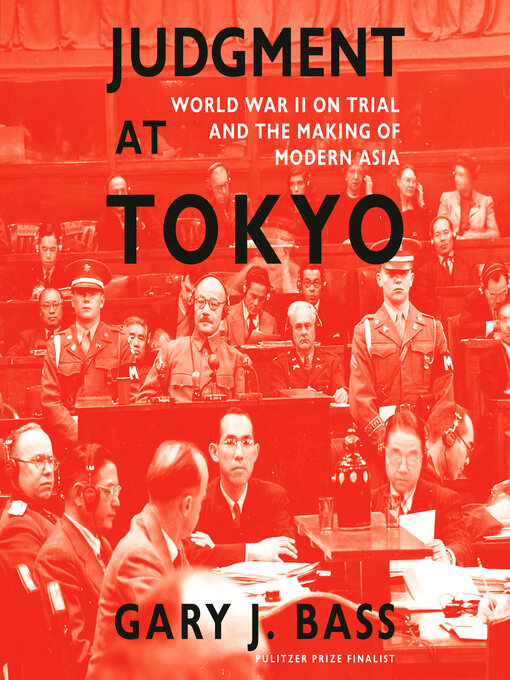Judgment at Tokyo
World War II on Trial and the Making of Modern Asia
“Nothing less than a masterpiece. With epic research and mesmerizing narrative power, Judgment at Tokyo has the makings of an instant classic.”
—Evan Osnos, National Book Award–winning author of Age of Ambition: Chasing Fortune, Truth, and Faith in the New China
In the weeks after Japan finally surrendered to the Allies to end World War II, the world turned to the question of how to move on from years of carnage and destruction. For Harry Truman, Douglas MacArthur, Chiang Kai-shek, and their fellow victors, the question of justice seemed clear: Japan’s militaristic leaders needed to be tried and punished for the surprise attack at Pearl Harbor; shocking atrocities against civilians in China, the Philippines, and elsewhere; and rampant abuses of prisoners of war in notorious incidents such as the Bataan death march. For the Allied powers, the trial was an opportunity to render judgment on their vanquished foes, but also to create a legal framework to prosecute war crimes and prohibit the use of aggressive war, building a more peaceful world under international law and American hegemony. For the Japanese leaders on trial, it was their chance to argue that their war had been waged to liberate Asia from Western imperialism and that the court was victors’ justice.
For more than two years, lawyers for both sides presented their cases before a panel of clashing judges from China, India, the Philippines, and Australia, as well as the United States and European powers. The testimony ran from horrific accounts of brutality and the secret plans to attack Pearl Harbor to the Japanese military’s threats to subvert the government if it sued for peace. Yet rather than clarity and unanimity, the trial brought complexity, dissents, and divisions that provoke international discord between China, Japan, and Korea to this day. Those courtroom tensions and contradictions could also be seen playing out across Asia as the trial unfolded in the crucial early years of the Cold War, from China’s descent into civil war to Japan’s successful postwar democratic elections to India’s independence and partition.
From the author of the acclaimed The Blood Telegram, which was a Pulitzer Prize finalist, this magnificent history is the product of a decade of research and writing. Judgment at Tokyo is a riveting story of wartime action, dramatic courtroom battles, and the epic formative years that set the stage for the Asian postwar era.
-
Creators
-
Publisher
-
Awards
-
Release date
October 17, 2023 -
Formats
-
OverDrive Listen audiobook
- ISBN: 9780593907917
- File size: 904031 KB
- Duration: 31:23:23
-
-
Languages
- English
-
Reviews
-
Publisher's Weekly
Starred review from August 28, 2023
This impressive history of the 1946–1948 International Military Tribunal for the Far East describes how Japanese military and civilian leaders were tried for war crimes committed throughout Asia and the Pacific from 1931 to 1945. Bass (The Blood Telegram), a professor of international relations at Columbia University, uses witnesses’ testimonies to offer comprehensive accounts of wartime horrors such as the 1937 Rape of Nanking, the surprise attack on Pearl Harbor, and the barbaric treatment of POWs building the Thai-Burma Railway, where an estimated 12,000 prisoners died. He also describes the politics and legal views of the 11 judges representing the Allies, the personal histories of the 28 leaders on trial, and the machinations of the U.S. to ensure that Emperor Hirohito was not held responsible for the war. The trial was a miscarriage of justice, according to Bass, who explains that the verdicts, which sent seven defendants to the gallows, 16 to life in prison, and acquitted six others, condemned several civilian government ministers who had been held hostage by a crazed, militaristic war cabinet and were unable to express antiwar views for fear of assassination. Bass also dedicates significant space to considering the Japanese defense that the war was necessary to free Asia from Western imperialism, and the divisive effect this discussion had on the trial. Bass astounds with his ability to tie so many complex narratives together. This is a clear-eyed look at a pivotal period in world history.
-
Loading
Why is availability limited?
×Availability can change throughout the month based on the library's budget. You can still place a hold on the title, and your hold will be automatically filled as soon as the title is available again.
The Kindle Book format for this title is not supported on:
×Read-along ebook
×The OverDrive Read format of this ebook has professional narration that plays while you read in your browser. Learn more here.

